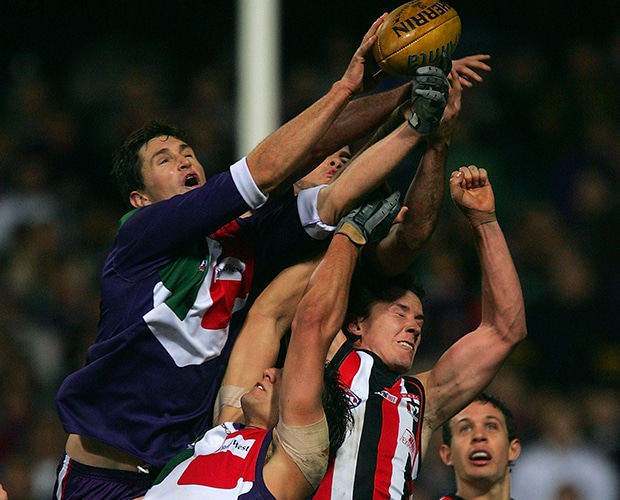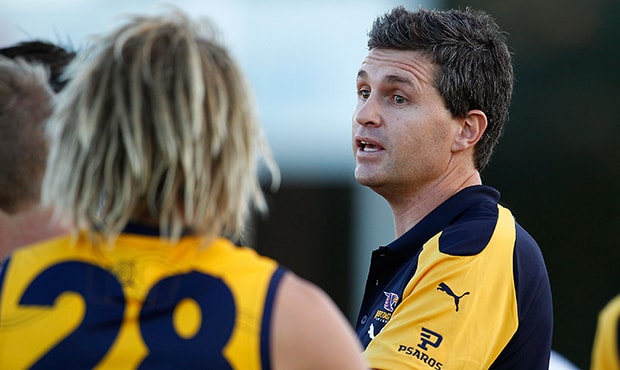After spending the best part of two decades playing and coaching at Fremantle and West Coast, Justin Longmuir found himself becoming worn down by the constant travelling back and forth across the continent.
But elite footy has been a constant in his adult life and he wanted to stay involved in the AFL. His answer was to move to the east, where the majority of clubs are based.
Longmuir’s desire for change was the Magpies' gain. Late last year he signed on as one of Nathan Buckley’s assistant coaches, then moved across to Melbourne with wife Melissa and two primary school-age children.
“The travel factor became a real drag,” the 37-year-old told Collingwood Media. “There was a need for me to be at home a little bit more with our kids getting a little bit older.
“Not having to be away every second weekend was a big factor in me not only wanting to move to Melbourne but to come to Collingwood.
“We play a lot of games in Melbourne, so that was a major driver of my decision, along with me wanting to get out of my comfort zone in a coaching sense and set a new challenge for myself.”
Longmuir, who is widely known as 'J-Lo', has enjoyed a long and winding footballing journey.

Justin Longmuir and Matthew Pavlich celebrate after Freo defeated Collingwood in an exhibition game in London in 2001 (AFL Photos)
Selected by Fremantle with pick two in the 1998 national draft, he played 139 games for the Dockers between 1999 and 2007.
A key forward and ruckman, Longmuir’s greatest on-field moment came in 2005 when he took a pack mark in the dying seconds of a game against St Kilda at Subiaco Oval, then calmly went back and slotted a goal after the siren.

Longmuir hauls in his match-winning mark against the Saints in 2005 (AFL Photos)
However, Longmuir’s career was cut short by a chronic knee injury, which forced him to retire at the age of 26.
Having begun his coaching career in a development role at Fremantle in 2010, he moved to West Coast in 2011 and spent seven seasons with the Eagles, rising to become Adam Simpson’s most senior assistant.
“Early in my coaching career, my two mentors were Neale Daniher and Phil Walsh,” he explained. “Those two, in different ways, imparted a lot of knowledge on me.
“Neale Daniher was great to talk with about the big-picture stuff and Phil was more about game-plans and driving standards and work ethic.
“Those two had a massive influence on my career, and Neale still does.
“Also, a sports psych by the name of Neil McLean [who is based at the University of Western Australia] has helped me with the mental skills of how to deal with players.
“That’s an area of the game that I think is still reasonably untapped, in the way we prepare our players – that mental toughness to be able to perform under pressure.
“You want your players to be in the moment and thinking about process rather than outcomes.”

Longmuir during his coaching stint at West Coast (AFL Photos)
When Longmuir arrived at Collingwood, he was handed the responsibility for coaching the backline and team defence, which was a role that excited him.
“Part of having a new challenge was looking after an area of the ground that I haven’t looked after before,” he said.
“I’ve done forward line, offence, midfield and stoppages at West Coast, but I hadn’t done the backline or team defence, so that was part of the package that drew me in.
“And the role helps build my resume and keeps me on my toes. It’s good.”
Longmuir has enjoyed working with his defensive group, which includes experienced players like Lynden Dunn and Jeremey Howe and inexperienced defenders like Sam Murray.
“The way I coach Dunny and Howey and the more senior guys is to try and give them some more involvement in the development of the younger boys,” he said.
“I want them to have more say and more responsibility and I’ve been really pleased with the way they’ve embraced that. It’s on them to impart their knowledge on the younger players and they’re doing that really well.
“It’s the responsibility of the younger boys to eat up that knowledge and learn as much as they can.
“Someone like Sam Murray has come in with a real energy and willingness to learn. That’s a real positive.”
When it comes to working with the other coaches, Longmuir has very much enjoyed getting to know Nathan Buckley and his other assistants, a group that features a number of new faces, including Garry Hocking and Matthew Boyd.
“It’s been a good environment,” he said. “Bucks has really made us new guys feel welcome and let us do our jobs and run our programs.
“Also, it’s always great coming into a new organisation with other fresh people, so you can share that experience.
“Matty Boyd, for a first-year coach, has been fantastic at helping me. We’ve bounced a lot of ideas of each other, so that’s been really good.
“Buddha’s the same. To have those fresh eyes on what you’re doing is a great thing. We’ve got a good coaching dynamic and we’re working well together.”
Although disappointed with the loss to Greater Western Sydney last weekend, Longmuir was pleased with the way the team defended against one of the competition’s most talented teams.
“As far as our team defence is going, I’m really happy with our method and how the players have adapted to a few changes,” he said.
“The way we defended GWS was really solid until the last 15 minutes of the game, when we got a bit tired.
“We’re seeing the benefit of working together a little bit more and being a bit more proactive with our positioning.
“But we’ve still got a lot to work on, like our ball-movement out of the back 50 and things like that.”
Longmuir is now itching to be part of his first Collingwood win, and he’d love nothing more than to see the boys sing the song after Friday night’s big clash with Carlton at the MCG.
But he knows that building a team that can enjoy a sustained run of success will take more than a week-to-week attitude.
“We need to let our footy do the talking and keep getting better. Then the results will look after themselves. I’m really confident about that.”



